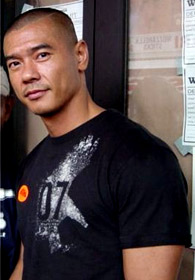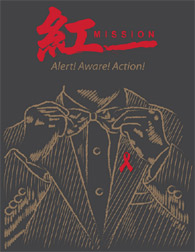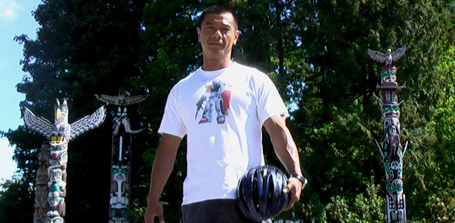To Joseph Bugo who has been living with HIV over 20 years, mental wellness is the most crucial factor that has helped him and what he thinks will give others the hope and strength to live. He is also an advocate of real life and in person sharing of experiences to reinforce the message to other PLHIV (people living with HIV) that one is not alone.
So strong is his belief that he wrote to Fridae to offer to share his personal experiences having tested positive in 1990 when he was just 24.
Born and raised in Hong Kong until he was 21 years old, he now lives in New York City although he has been travelling to Hong Kong twice a year in the last four years to visit his family and volunteer his time attending support groups organised by various HIV organisations.
He tells Fridae that he has been the top seller in the menswear department in the company where he has worked for the past 12 years. “At work, everyone knows about my status and my coworkers treat me like any working professional with respect.”
But it wasn’t so easy at the beginning.
“The mind controls the body,” he told Fridae of his personal experiences.
“I truly know what emotional pain feels like and how it can bring havoc to one's health. I had my fair share of suffering depression and anxiety in the past and now the last three years I learned how to cope, did a lot of reading believing now a healthy mind is so important part of treatment and well being for anyone living a lifelong manageable condition.”
Joseph is scheduled to attend the Red Mission GaP Party (Gay Pride Party) on April 30 at Hullett House (Heritage 1881, No. 2A Canton Rd, Tsim Sha Tsui, Kowloon) and support group sessions mainly with MSM PLHIV but also combined sessions with women and heterosexual participants. For more details, please contact the Hong Kong AIDS Foundation.
æ: Since testing positive, did you share the news of your initial positive test result with someone?

Joseph: Yes. In 1990, I had a few friends who had either AIDS or living with the virus. When I got my results back from the clinic that afternoon, I froze, numbed, speechless.
The first thing came to my mind was a close friend who lived close by my area and I went straight to his apartment to let him know the bad news. He was very sad. I firmly asked him what I really need to do now in order to keep myself healthy. I needed some directions where and how to find info and resources to understand the virus. It was not easy to deal with my results during the dark times in the 90's, almost everyone I knew were sick or dying. It was also the time before protease inhibitors came out as a promising treatment.
æ: Why did you choose to tell this person?
Joseph: I chose this person because he was an AIDS activist for many years, very knowledgeable and has been living with AIDS for many years. Sorry to tell you he passed away few years later moving back home with his family. He provided me some info where to go like attending support groups at the community centre and recommended me to read a few books about HIV. At that time, there were limited resources to find on the Internet.
I also told the news to my best friend. He was sad and shocked. We are still best, best friends today and he is so proud of me what I went through all these years being so positive minded. When I am down, he has always been there for me to lift up my spirit back up. I thank him for that.
However I decided not to tell my parents and family until eight years later. The main reason was the last thing I needed from someone to be over worry about me. That would make me feel more uncomfortable and a lot of pressure on me.
I only decided to tell my parents after I was on anti-viral medication for two years, to ensure them nothing to worry, as I have been living with the virus over eight years and doing well so far. All I asked from them was to be there for me, accept me, love me and continue to support my strength to live and fight this manageable condition.
æ: Has your HIV status changed your sex life significantly? If so, how?
Joseph: With my HIV status, it did change my sex practices significantly. I worry about infecting others even with safe sex condom use. Before I was tested positive, I did practice safe sex and on few occasions, unsafe sex. I was that type of person. Since knowing my status and aware that STDs is on the rise, the last thing I need is to infect my body with another bug to put more harm to my immune system.
My sex practices now are definitely, no doubt condom use for anal intercourse. However, I do not engage much in intercourse. I don’t give up my booty that easy. The boys have to earn it! I am much more selective on choosing who to have sex with. My favourite sex approach is safer sex: oral sex, body contact, massaging each other, hugging, a bit of dirty fun talking, with a smile.
æ: Has your approach to love and relationships changed since you found out you were HIV-positive? Why?

Joseph: Yes for many years, I was not ready to commit in a relationship, mainly disclosure was never an easy thing to do and afraid of rejection. Slowly I realised it was me and what was in my head to fear the worst. I do have anxiety issues to deal with all those years.
Fast forward, I am in a five-year relationship, going strong, there for each other both good and hard times. We adopted two rescued dogs four years ago whom we consider to be our kids; one boy and one girl. One big happy family. By the way, my partner is HIV-negative.
æ: How do you decide whether to tell someone your HIV status?
Joseph: It all depends on what is the purpose and intentions to disclose to him or her. It could be you want them to know your real self and still accept you as a dear friend or to educate them that such person like me exist. Acceptance, honesty are always my main virtues.
æ: What is one myth about living with HIV that you’ve now realised was incorrect?
Joseph: Not one myth. There are so many myths.
Living with HIV does not mean you will or eventually developed AIDS. It is no longer a deadly disease. With many promising medications available now, living with HIV to me is just like any other manageable health conditions, like diabetes, cardiovascular heart problems, etc. We need to remind us and the public that the virus does not kill you; it's the infections that kill you that make you weak and sick. There is no life cap what most people think living with HIV is the most 10 years. I am living with the virus over 20 years and still going strong.
æ: Tell us about one of your most memorable disclosure stories (friends, family, colleagues/bosses, doctors, partner or dates, etc).
Joseph: My best moment on disclosure definitely is with my current partner. I told him right on the beginning of our second date. He accepted me regardless of my status. I wasted no time. Why fear? Not my loss! Let me be nice, hahaha.
There were many memorable honest moments. Every time when I have the opportunity to disclose my status, say my family members, co-workers, my managers, my friend’s friends, I feel more and more comfortable about whom I am. I have nothing to be ashamed of myself and I refuse to be a victim in the society.
æ: Has your relationship with your family and friends changed or evolved after you found out you are HIV-positive? If so, how?
Joseph: I would say my family and friends, for all those years, know how capable I am taking care of myself, especially my friends who believe so much in me that I am also helping their friends who are also HIV positive and share our experiences.
We evolved. I bonded with my family like they were my best friends and my best friends like we are family.
æ: Have you started Anti-Retroviral treatment (ART)?
Joseph: Yes. I tested positive in 1990 and started my Anti-Retroviral medication in 1997. My current cocktail treatment is working wonderful. I am on Isentress, Intelence and Truvada for over two years now. My viral load is undetectable and my CD4 count went up to 550 from 200 two years ago. I am blessed.
Two and a half years ago, through the Genotype test, I found out I developed resistance to the current Anti-Retroviral medication I was taking and had to switch to three new medications.
Within a month, I experienced a major side effect on the new medications. My blood glucose level went so high within a month; I lost 30 pounds. I was devastated; physically I looked very weak and sick. Along with my anxiety and depression, on a few occasions I had suicide thoughts. The worst feeling I ever felt in my entire life. The hardest part I felt during that time was I had to stop those three medications and to start another three new medications immediately. I was very scared. Do I have a choice? In my mind I don't think I am going to make it. I told myself what the hell, give it a shot, I have nothing to lose. I already lost 30 pounds.
Now, three years later. I am alive and so well. I believe there is a god or a guardian angel, along with a bit of luck, truly gave me a second chance to live.
Looking back now, I am glad I had the opportunity to go through physical and emotional suffering to know what pain is and truly knows how and what other people have to go through living with HIV. If I have not gone through that process, I would not be here so dedicated to help others. Hope is so important in our life to move forward. I also learned to appreciate everything and everyone around us and never take things for granted. I believe I evolved and learning is a never ending process to be a better person. I am blessed and fortunate I am doing very well now, physically, mentally, spiritually best I ever felt in my entire life.
æ: What challenges, if any, have you found in pursuing a career and living with HIV?
Joseph: To be honest, there were no challenges in pursuing a career. I never would use my health or condition as an excuse to skip work or take a day off. I think that is bad karma.
æ: Have you ever experienced discrimination on the basis of your HIV status from government agencies (eg. police, health workers, schools, employment officials, immigration agencies) or other areas (employers, businesses, clubs, etc). If so, please tell us what happened.
Joseph: I am quite aware about government and work policies through readings and know my rights. I never experienced harsh or inappropriate discrimination in any way .But if anyone tries and mess with me, there will be consequences.
æ: Can you share one humorous or odd thing about your life with HIV?
Joseph: I disclosed my status to many people over many years. Their first reaction was that I did not look like what they would think someone living with the virus to be so healthy and they could not tell from the way I look and the way how I carry or conduct myself. They asked questions and through disclosure, I gave them accurate information and better understanding more about the virus.
When they asked me questions about sex, my favourite quote, “Remember, sex does not always have to be intercourse.
æ: What needs to happen in order for people living with HIV to feel more comfortable about telling people about their status?
Joseph: There are so many ways, approaches to be comfortable to disclose with the right situation in the right time at the right place. It is also how you like to say it with a little bit of your thought with an appropriate delivery of speech.
For me, be healthy physically, strong mentally to face any rejections, believe spiritually your honesty. Those are my beliefs to give me the confidence, comfort level when I have a chance to disclose my status, with a smile. See their reactions; take it from there, with the intentions either to help them a better understanding about HIV and awareness that such person exist like me within the community.
Luckily, from my past experience, I could only recall two rejections. They walked away or simply ignored me. I did not feel bad, guilt or angry about the other person. In my mind, wish them best of luck and hope they would learn from this as an experience.
æ: Stigma and discrimination against people living with HIV is often quite challenging for everyone. What is one simple thing that people could do to encourage more acceptance in the community?
Joseph: The stigma and discrimination still exist even within the gay community where many are not comfortable to come out.
Myself and other long-term non-progressors or long term survivors; we have to be better role models for the society and to others PLHIV. It has to come from us first, in order to have more acceptance from the community. Then eventually fewer stigmas from our community to the rest of the society. It is a domino effect from my point of vision.
We cannot blame the public for their ignorance. More so, there is still a lot of work ahead of us from PLHIV, activists, government and other organisations. We have to re-think, re-inform, re-educate the module of approach to lower the increasing infection rate.
æ: What is one thing that you want to do in the future to help the LGBT or PLHIV community?
Joseph: May I list more than one thing?
1st and foremost: Emotional support to all PLHIV and others affected by the epidemic. Mental wellness is so crucial to give everyone the hope and strength to live.
2nd: Share our living experience, with a real face and body that we do exist as a person living and look like anyone else you might see on the streets and on the subway platform. It reinforces a strong encouragement to other PLHIV that you are not alone.
3rd: Introduce a program for PLHIV, have awareness and be part of social responsibility and give back to our community. It has to take a HIV positive person to infect a HIV negative person.
4th: The importance and benefits of early testing and safer sex practice, not just safe sex in the LGBT community. Early testing certainly helps those infected with HIV to live much longer and to live and lead a healthier quality life. Those messages should expand to a wider audience through public statements like magazines advertisements or interviews, public speaking or government funded public messages on bus stops or subway.
5th: Demonstrative 2-3 minute videos depicting various sex situations and scenarios like on line hook-ups, sex in public places, how to negotiate safe and safer sex practices in the heat of passion.
6th: Provide statistical information on HIV and STD increasing infection rates over the last 6 years to our community and re-address the importance of condom use.
æ: What motivates and inspires you for the future?
Joseph: To continue and believe my efforts, I am making other people’s lives better and more and more people like me have the courage to come out and give back to the community. I cannot do this alone. It’s a collective effort.
Disclaimer: This article is intended for informational and educational purposes only and is not engaged in rendering medical advice or professional services. The information provided should not be used for diagnosing or treating a health problem or a disease. It is not a substitute for professional care. If you have or suspect you may have a health problem, consult your health care provider.
If you are HIV-positive and living in Asia, and want to share your story, please write to editor@fridae.com.
Look out for PositiveVoices.Net, a soon-to-be-launched social networking site for HIV-positive gay men and transgender people living in Asia built around their shared experience of living with HIV.

